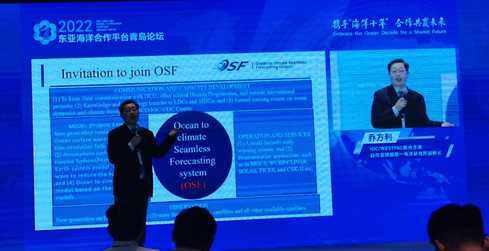|
On 8 June 2022, the Assistant Director General of UNESCO and Executive Secretary of IOC, Dr. Vladimir Ryabinin, officially sent a letter to congratulate on the official approval to the Ocean to climate Seamless Forecasting system (OSF), which was led by the First Institute of Oceanography, Ministry of Natural Resources (FIO), led by Fangli Qiao, academician of the international Eurasian Academy of Sciences, and jointly sponsored by 34 marine and climate research institutions in 25 countries and 3 international organizations. This is the first large-scale scientific program in the field of physical oceanography in China launched under the framework of the United Nations, marking that China has stepped from the long-term scientific and technological accumulation and development to the leading stage of international science in the core field of ocean and climate prediction, which is highly concerned by the world.
Focusing on the international scientific frontier of ocean and climate prediction, FIO has formed a new pattern for decades based on the original wave induced mixing theory, with the development of the internationally first wave tidal current circulation coupling model and the first earth system model including waves as the breakthrough point, and supported by the observation of new high-efficiency surface drifting buoys. The OSF Big Science Program approved this time aims to solve the fifth challenge of the “ocean decades”, aims to cross the “build zone” between the current 7-day forecast and the short-term climate forecast of several months, and work with international partners to promote the substantial improvement of the ocean and climate forecast ability. The implementation of the OSF Big Science Program will focus on the following five aspects: strengthening the scientific understanding of the relationship between the ocean and climate, and further clarifying the controlling role of the ocean in the climate system; based on the ocean satellite and Beidou satellite observations and theoretical and technological breakthroughs, greatly improve the ocean observation capacity; on the basis of the breakthrough of forecast theory and technology, the combination and assimilation between observation data and advanced model can be realized. And the “blind spots” of forecast can be crossed, and the forecast ability can be substantially improved. China will develop an early warning system for marine and climate disasters, provide high-quality public services to the international community, and participate in global ocean governance with the support of science and technology. Capacity building will be carried out for the younger generation, especially for young science and technology backbone from small island developing States, least developed countries and landlocked developing countries, and cultivate the advanced knowledge and ideas of the world’s young scholars in the field of marine science and technology and marine governance will be fostered. As a global or regional action, the Big Science Program has the characteristics of focusing on major marine scientific issues, interdisciplinary, multi-national participation, long implementation cycle and large investment. It has the highest scientific priority and the greatest difficulty in application, organization and implementation. The first "action plans" convened between October 2020 and January 2021, focusing on all 10 scientific challenges of the Decade, received 214 applications from around the world for major science projects, of which only 31 were approved. The first two projects approved in China are "River Delta: seeking solutions for sustainable problems" initiated by the State Key Laboratory of estuarine and Coastal Science of East China Normal University and the "global estuarine pollution monitoring" grand scientific plan initiated by the State Key Laboratory of marine pollution of City University of Hong Kong, both of which focus on offshore estuarine areas. From April to July 2022, the third round of "action plan" of "ocean decade" focusing on marine food and blue economy is being solicited. |
The United Nations "Ocean Decade" Big Science Program led by the First Institute of Oceanography was Successfully Approved
Date: 2022-06-30 15:20 Author: admin Clicks:

